
Study Tips
Hello! Here are some study tips, tricks and ideas for you to try. I hope you find them useful.
Study Strategies and Methods
There are a variety of study strategies and methods you can use depending on your learning styles and personal preferences. I use a variety depending on the subject and what I’m studying for; presentation, lab, different types of exams etc. Here are some of my favourites:
Active Recall
This is essentially testing yourself continuously as you study and during revision. This is proven to be one of the most efficient methods of retaining information. Ways you can practice active recall include doing practice questions and past papers I highly recommend!, using flashcards, studying/reading about a topic then writing down everything you remember without the books and writing your own questions about a topic. I use flashcards a lot, below is an example of what my flashcards may look like, they aren’t meant to have too much information on just the basics of what you need to remember. If you prefer online flashcards, Anki is one of the most used and recommended systems.
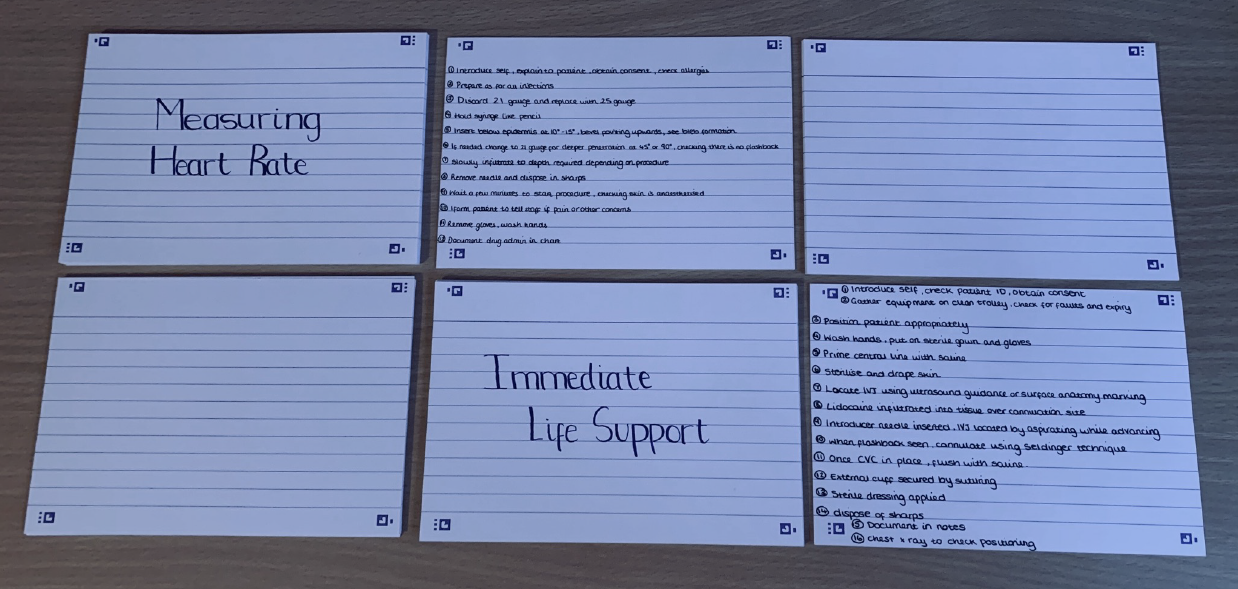
Spaced Repetition
This is also proven to be highly efficient and effective. I use this to base my study schedule around to make sure I cover all of the necessary material and take it in properly. This method is based on the principle that the more often you encounter information, the more you remember, but with breaks in between. It has been proven effective for long term retention especially. There are set schedules you can follow that have been studied and shown to be effective, you can try out other people’s schedules or tailor your own. Personally, this is the schedule I would usually aim to follow:
- After attending lecture on a specific topic, that same day (ideally within a few hours, if going home or having a break between lectures) write notes on that topic.
- Review topic 24 hours after attending lecture.
- Reviewing for me can include reading over notes, making and using flashcards, reading a textbook, doing past paper questions, making mind maps, asking questions, teaching someone etc.
- Review topic 48 hours after attending lecture.
- Review topic 1 week after attending lecture.
- Review topic 1 month after attending lecture.
This can be changed to review more or less often depending on your personal circumstances, for example how much time you have between finishing a topic and taking the exam. When revising immediately before an exam (usually the week before) reading over content just before going to sleep and just after waking up can help your brain retain and file away information.
Interleaving
The aim of this strategy is to keep your brain focussed with shorter bursts of revision on several related topics interleaved together. Time lengths, break lengths and topics can be changed depending on personal preferences. You can also use this strategy when revising to split your day into 3 sections, during 2 of which you study and during the other one you do something fun or relaxing. Here is an example that I might use:
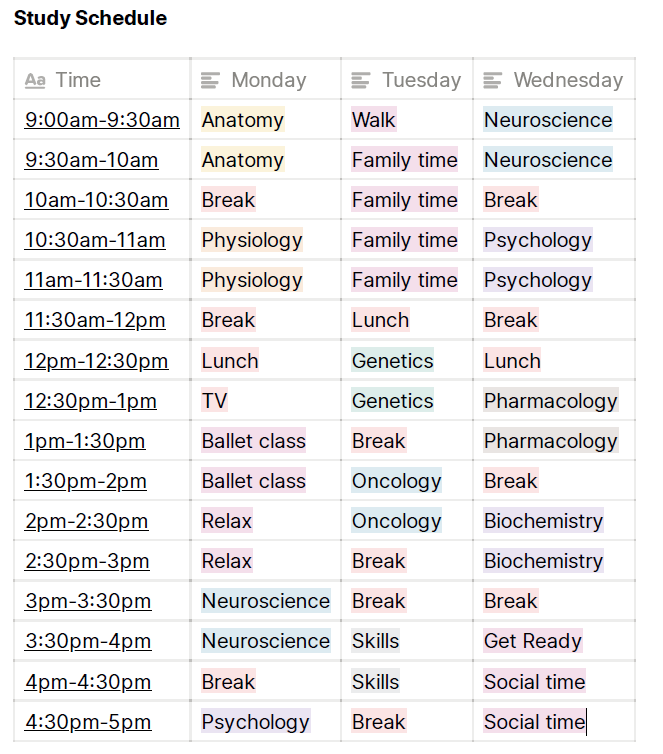
Mind Maps
I find these very useful for summarising. Typically, I would make one topic per page, using colour coding, abbreviations and symbols to make it as efficient as possible. Some people choose to put their mind maps up around their room or house so they encounter the information more often.
Notes
Notes are not the most efficient way of learning and retaining information but they work for me personally as I put things in my own words. They help me to collate all relevant information together concisely and then I work from them to produce mind maps, flash cards etc. You don’t have to take lots of notes, or any at all, its personal preference. There are lots of Instagram accounts to follow for inspiration if you do enjoy notes. Below are some examples of notes (the best ones are in our attic since finishing all exams!
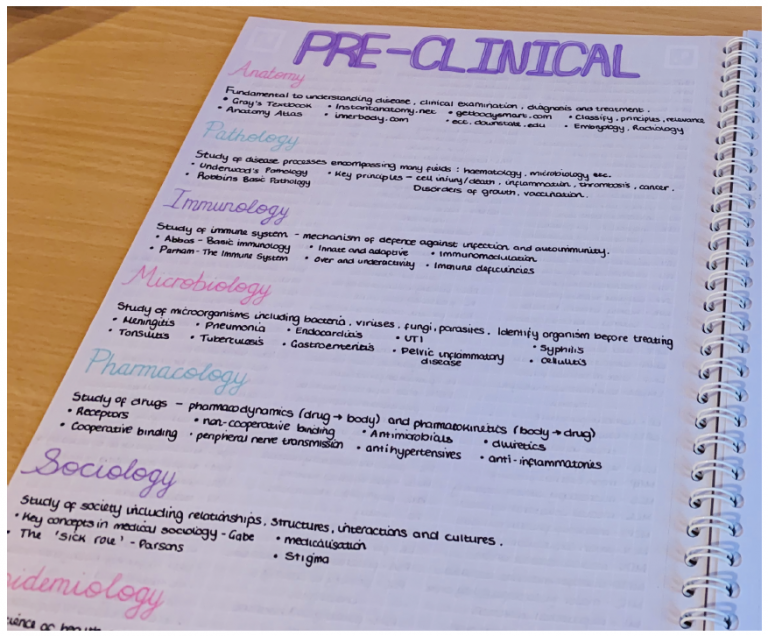
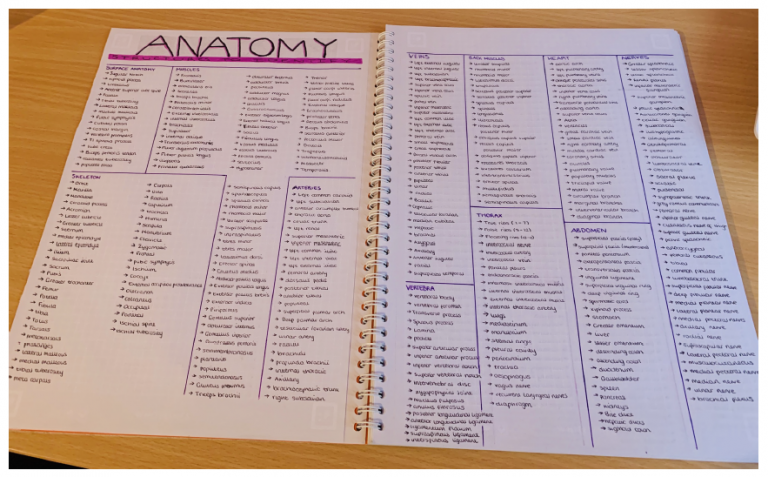
Teaching
A great way to ensure you have a deeper understanding of a topic is to teach someone else. It encourages you to think of different ways to explain things and you may get asked questions you haven’t thought of or that don’t appear in past papers. I have used this for years and it really helps identify areas you are unsure of that you might not even have realised you needed to go over again.
Study Supplies
Notebooks
My absolute favourite notebooks are Whitelines notebooks. They are a Swedish company which makes paper and notebooks that are grey with white lines to make your notes really stand out (see notes pictures above). I also like to decorate notebooks sometimes to make them fun or colour code subjects.
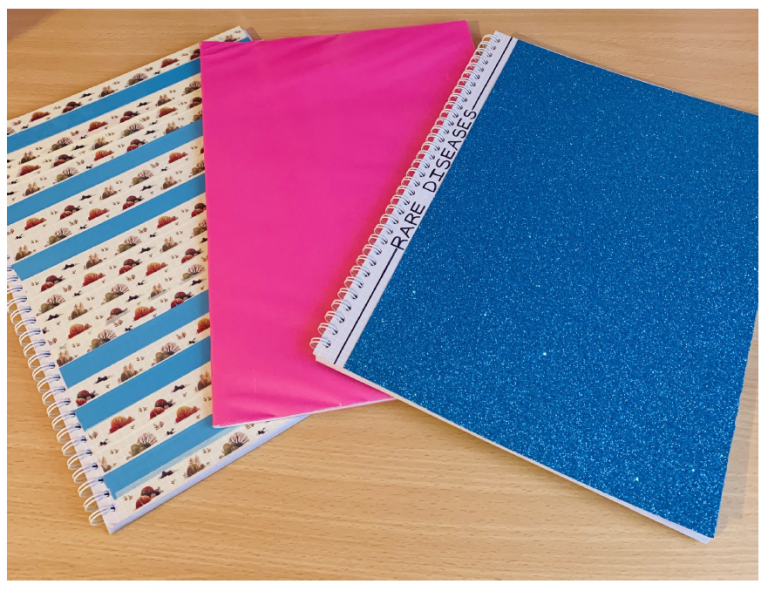
Pens
For the main body of text my preference is to use black ink. My favourite pens include Pentel Oh! Gel, Papermate InkJoy Gel and Zebra Sarasa.
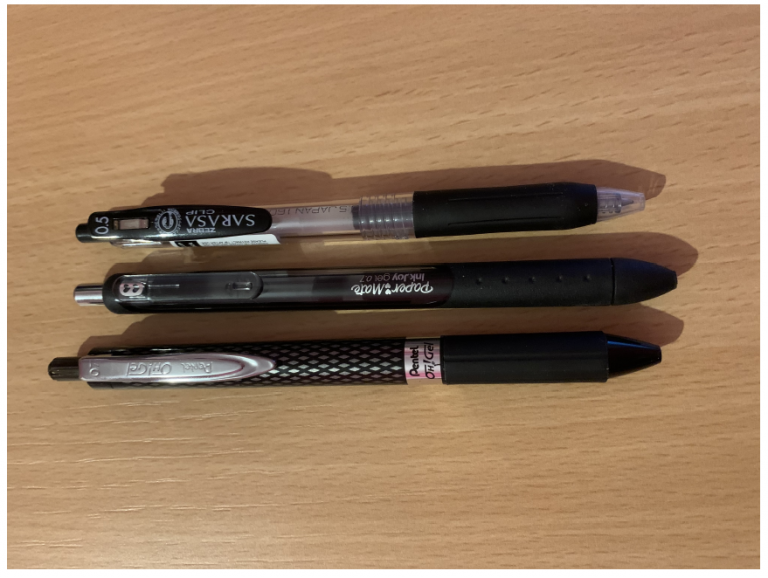
I love to write in different colours for headings or to colour code and separate sections. Some of my favourite coloured pens are Zebra Mildliners, Zebra Sarasa and Papermate Inkjoy.
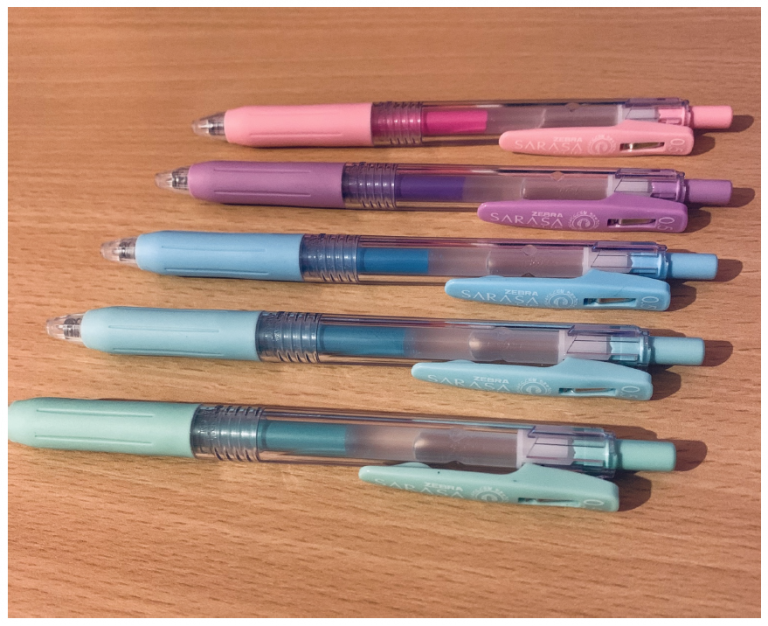
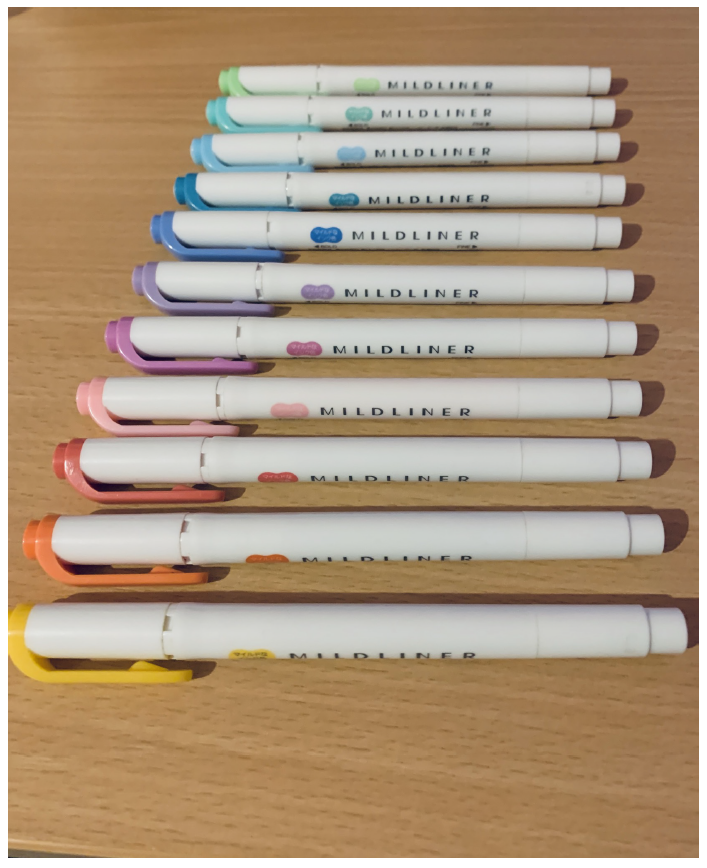
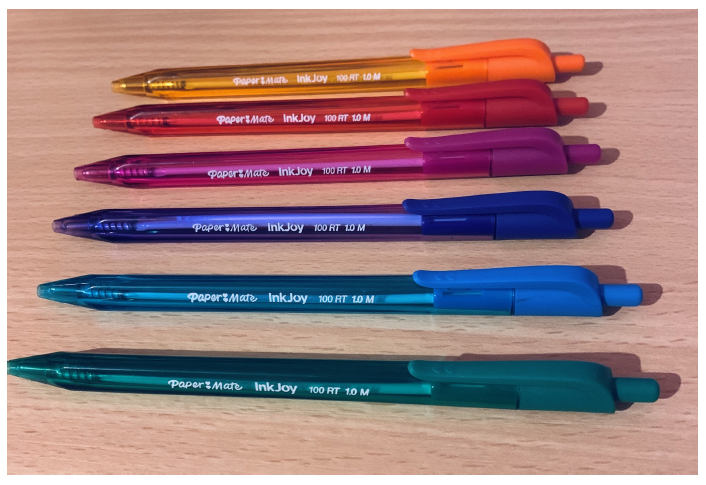
The Zebra Mildliners can be used as highlighters but I’m also a big fan of Stabilo highlighters.
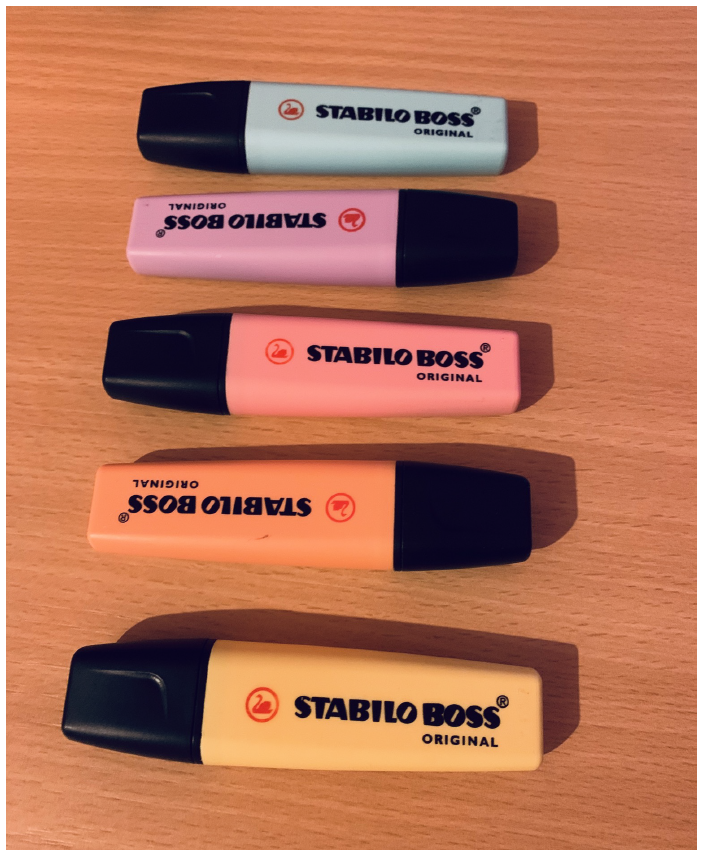
Post it Notes
Post it notes are great for putting notes in textbooks or writing facts and figures you need to know. You can then put them around the house to recall Study Tips 12 facts throughout the day. I like to use bright colours and lined Post it notes especially.
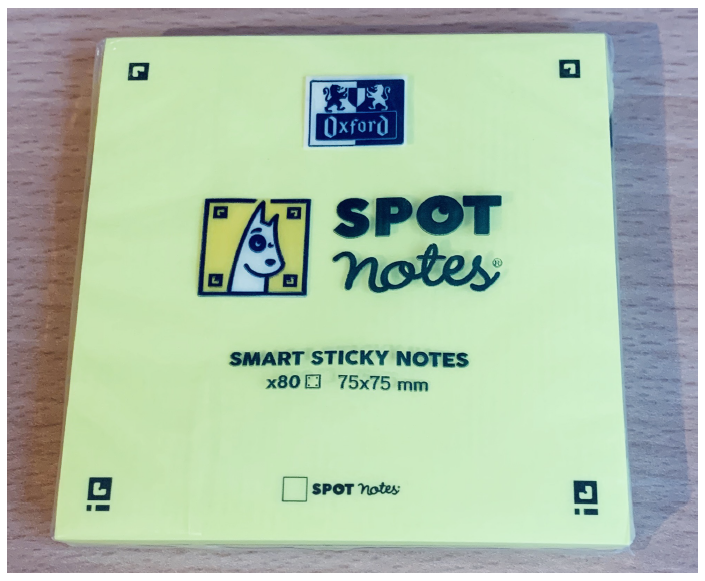
Tabs
These are useful to mark certain sections in textbooks or notebooks, to add notes or draw attention to certain paragraphs.

Organisation
Staying organised is essential for efficient and enjoyable studying. Organisation is very personal as it has to be a system that works for you and you can, for the most part, stick to. I have always used planners for study, there are so many different types you can find one that is right for you if you want to use a planner. If you want to use an online way to organise such as an app, there are many available. I currently use Notion to organise everything including study planning, resources, budgeting, goal setting, to do list etc. For studying in particular, my favourite way to organise is by colour coding. This is not for everyone, you can use other things to organise and separate work from symbols and patterns to numbers and codes. During GCSE’s and A levels I had a folder and notebooks for each subject in a different colour. For example, during A levels, Biology was pink, Chemistry was blue and Spanish was purple. My folders, notebooks, flashcards, headings in notes and mind maps were in the designated colour. You can colour code in any colours you like and it doesn’t have to be everything (like flashcards), for me it’s just the easiest way for my brain to identify and associate which subject something is relevant to. During University I used a similar system with a colour for each module during the year. Colour coding can also be done in electronic notes, mind mapping software or whatever format you might be using.
Final Tips
- You do not have to do everything all at once. There are many different options and no one person is supposed to use them all. Once you have found what works for you you can stick to those couple of methods, strategies or systems.
- Try not to feel pressured to study all the time and always stick to the schedule. Things happen, circumstances change, nobody always follows their schedule perfectly. If they say they do, they are not being honest. You should not feel bad for taking time off that was supposed to be work time if you need it, or for changing your plans if you feel more comfortable doing so. We’re all human and just trying our best.
- Do what is right for you. I use a combination of paper and electronic methods depending on my needs, some people would say you shouldn’t do that. Some people say you should not take notes or spend much time on them as it isn’t the most efficient but I still like to have notes and it hasn’t harmed by progress. If something is working for you, you feel comfortable and are achieving what you want to then don’t change it because someone else says so.
- Be proactive. If something isn’t working, try something else. If you need to go over something again, make sure you do. If you feel your brain switching off, switch it up or take a break.
- Enjoy your studies!
Accounts to Follow
Here a some accounts I like to follow for inspiration and tips, you may prefer other ones. There is a whole community that you can explore to find what you like.
@studytee
@whitelinespaper
@studyandorganiz
@a.medstudents.journey
YouTube
Ali Abdaal – Ali Abdaal Youtube Channel
studytee – Studytee Youtube Channel
studyquill – Studyquill Youtube Channel

